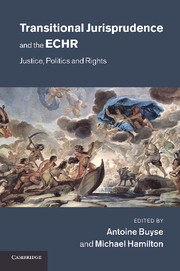Book contents
- Frontmatter
- Contents
- Foreword
- Acknowledgements
- 1 Introduction
- 2 Transitional emergency jurisprudence
- 3 Rights and victims, martyrs and memories
- 4 Confronting the consequences of authoritarianism and conflict
- 5 Freedom of religion and democratic transition
- 6 The truth, the past and the present
- 7 Transition, political loyalties and the order of the state
- 8 Transition, equality and non-discrimination
- 9 Closing the door on restitution
- 10 The Inter-American human rights system and transitional processes
- 11 The ???transitional??? jurisprudence of the African Commission on Human and Peoples??? Rights
- 12 Conclusions
- Index
- References
6 - The truth, the past and the present
Article 10 ECHR and situations of transition
Published online by Cambridge University Press: 07 September 2011
- Frontmatter
- Contents
- Foreword
- Acknowledgements
- 1 Introduction
- 2 Transitional emergency jurisprudence
- 3 Rights and victims, martyrs and memories
- 4 Confronting the consequences of authoritarianism and conflict
- 5 Freedom of religion and democratic transition
- 6 The truth, the past and the present
- 7 Transition, political loyalties and the order of the state
- 8 Transition, equality and non-discrimination
- 9 Closing the door on restitution
- 10 The Inter-American human rights system and transitional processes
- 11 The ???transitional??? jurisprudence of the African Commission on Human and Peoples??? Rights
- 12 Conclusions
- Index
- References
Summary
Introduction
‘Frankly, I do not believe that the fascist organizations … have any independent existence, outside the state apparatus’, wrote senator Miguel Castells in a magazine published in the Basque Country in 1979. Thirteen years later, as the Iron Curtain which had divided Europe for so long had for the most part been torn down, the European Court of Human Rights dealt with this case which touched upon a much less recent transition from authoritarianism to democracy.
In the article, Castells wrote about a series of unsolved murders in the Basque region. He claimed that the authorities refused to investigate who the murderers were and even asserted that the government was quite certainly behind these acts. It can be added that Castells??? article was published in a period which also marked the apex of ETA terrorist activity. The Basque Country was in a situation of turmoil, whereas Spain itself was tentatively trying out democracy after the first multi-party elections and a newly approved constitution in the previous years. In this context the state apparently deemed the article by Castells, a senator for the opposition, so dangerous that it had him prosecuted. He was convicted for insulting the government, by a court mostly consisting of judges appointed during the Franco regime. Subsequently, he took his case to the European Convention institutions in Strasbourg. The European Court of Human Rights found a violation of his freedom of expression.
- Type
- Chapter
- Information
- Transitional Jurisprudence and the ECHRJustice, Politics and Rights, pp. 131 - 150Publisher: Cambridge University PressPrint publication year: 2011
References
- 2
- Cited by



